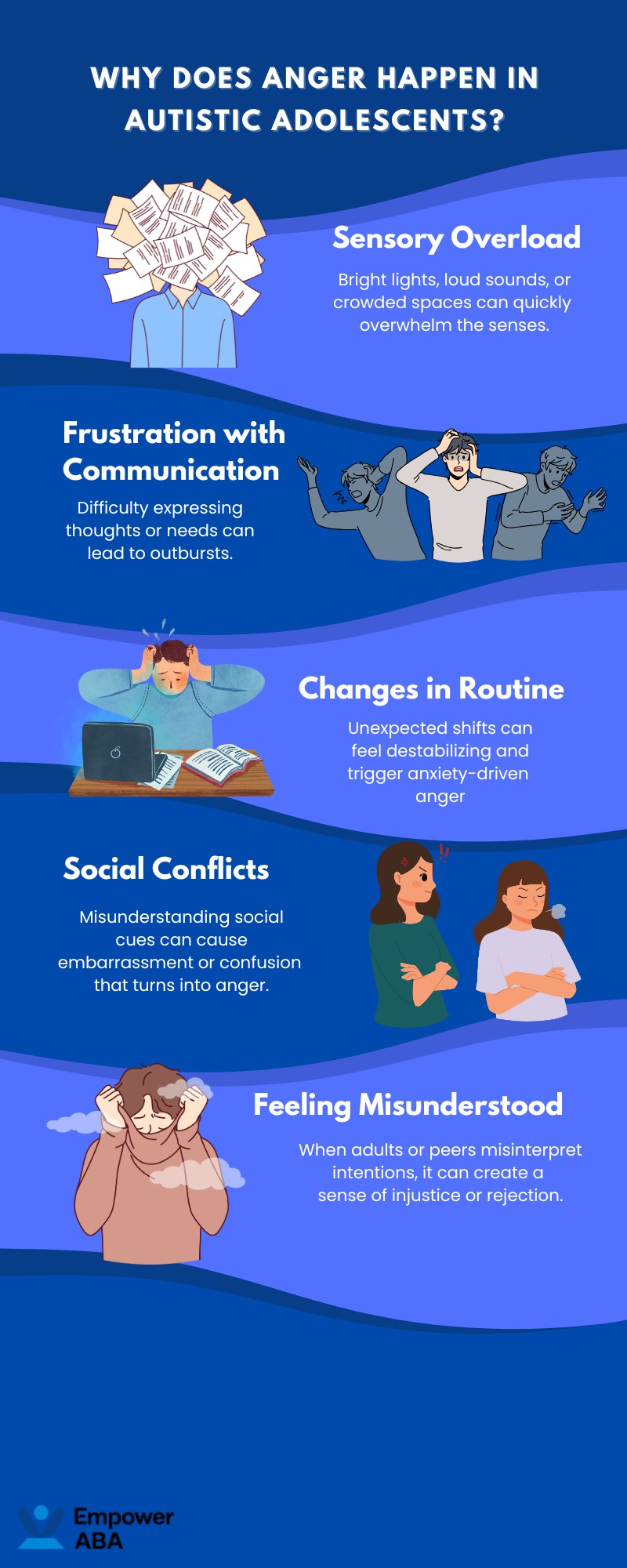Key Points:
- Anger in autistic adolescents often stems from sensory overload, communication struggles, or emotional regulation challenges—not defiance.
- Parents can support their teens by identifying triggers, staying calm, and teaching coping skills.
- ABA therapy offers structured strategies to help teens manage anger and develop better emotional responses.
Adolescence can be a rollercoaster of emotions for any child, but for parents of autistic teens, that ride often feels even more intense. The teenage years bring new challenges—changing hormones, increased social demands, and growing independence.
When anger enters the mix, it can leave parents feeling helpless or confused. But understanding autism and anger in adolescence starts with recognizing that these outbursts aren’t just “bad behavior”—they’re often cries for help.
Is Anger a Normal Part of Autism in Adolescence?
Yes—anger can be a common expression for autistic adolescents. But it’s usually a signal of something deeper: sensory overload, unmet needs, or difficulty expressing emotions.
Understanding the connection between autism and anger in adolescence is essential for supporting your child in meaningful ways. While not every autistic teen will display anger, many do—often because they are overwhelmed or unable to communicate what’s bothering them. What may look like defiance or aggression is frequently a sign of distress.
Why Does Anger Happen in Autistic Adolescents?
Adolescents on the autism spectrum may experience anger differently than neurotypical teens. Their brains process information, emotions, and sensory input in unique ways, which can impact how they respond to stress.
Recognizing common causes of anger can help families prevent future meltdowns. While every teen is different, several shared triggers often surface:

Sometimes, it’s not just one trigger—but a build-up of small stressors that eventually boil over.
How to Tell If It’s Anger or Something Else
Parents often wonder: is my teen really angry, or is something else going on? Understanding the difference between anger, frustration, and anxiety is key.
Sometimes, an outburst may be masking another emotion. These are signs that often get mislabeled as “just being angry”:
- Crying or yelling during difficult tasks (could be frustration or sensory distress)
- Withdrawing or shutting down after an argument (could be anxiety or confusion)
- Aggressive behavior after transitions (could be difficulty with change, not defiance)
Reading between the lines—and looking at what happened before the outburst—can give insight into what your teen is really feeling.
How Can Parents Support a Teen with Autism and Anger?
When anger surfaces, it’s not just about reacting in the moment—it’s also about long-term strategies that help your teen feel safe, understood, and equipped to cope. There’s no magic solution, but a combination of patience, structure, and emotional support can go a long way.
Here are some practical ways parents can help:
1. Identify and Avoid Triggers
Start by tracking when and where outbursts happen. Over time, patterns may emerge—such as specific times of day, tasks, or environments.
2. Create Predictable Routines
Stability is calming. Keep routines consistent when possible, and use visual schedules or reminders to prepare for changes.
3. Teach Coping Skills
Breathing exercises, movement breaks, or a designated “calm-down zone” can empower teens to manage their own emotions before they escalate.
4. Model Calm Reactions
Staying calm during an outburst shows your teen that emotions can be managed—and keeps the situation from spiraling.
5. Use Clear Communication
Avoid sarcasm or abstract language. Be direct, and give choices when possible (“Do you want to take a break or keep going for five more minutes?”).

When Should You Seek Help?
Sometimes, anger becomes a recurring challenge that affects school, home life, or relationships. If you feel like nothing is working, or if aggression is increasing, professional support can help.
Reach out for guidance if you notice:
- Frequent meltdowns or aggression that affect safety
- Difficulty calming down even after a trigger has passed
- Declining performance at school or in social settings
- Increased anxiety, withdrawal, or depression alongside anger
A professional—such as a behavioral therapist, counselor, or developmental pediatrician—can help identify underlying causes and offer personalized strategies.
The Role of Emotional Development in Autism and Anger
Emotional growth is a big part of adolescence, but for autistic teens, it may happen differently—and more slowly. Autistic teens often struggle with “emotional regulation,” or the ability to manage big feelings like anger or sadness.
This isn’t a choice—it’s a skill they may not yet have. That’s why teaching emotional vocabulary, offering tools for self-soothing, and providing a calm environment are all crucial steps. These supports also empower individuals to show up authentically rather than suppress who they are—something we explore more deeply in our article, Stop Masking Autism: Steps to Embrace Your True Self.
Teaching Teens to Recognize and Express Emotions
Autistic adolescents may need more guidance to identify and name their emotions. Helping them build this skill can reduce future outbursts.
Here are some creative, low-stress ways to help teens connect with their feelings:
- Use Emotion Cards: Show faces with different expressions and discuss what they mean.
- Create an “Emotion Thermometer”: Visual scales help teens rate how intense a feeling is.
- Check In Regularly: Ask, “How’s your body feeling right now?” instead of “Are you angry?”
Over time, these practices help teens pause, reflect, and choose better responses to difficult emotions.
Empower ABA: Helping Teens Navigate Big Emotions
Managing autism and anger in adolescence is not something parents need to do alone. Support is available—and can make a world of difference.
At Empower ABA, we specialize in Applied Behavior Analysis (ABA) therapy designed to help children and teens develop skills for better communication, emotional regulation, and behavior. Through structured, evidence-based techniques, we support families in addressing the root causes of anger and helping teens build the skills they need to thrive.
Whether you’re just starting to explore behavior support or looking for a deeper level of care, we’re here for you. We proudly offer ABA therapy in Virginia, New York, and New Jersey, tailored to meet each child’s unique needs.
Reach out to us today to learn how we can help your teen navigate emotions with confidence, and help your family find greater peace at home.

